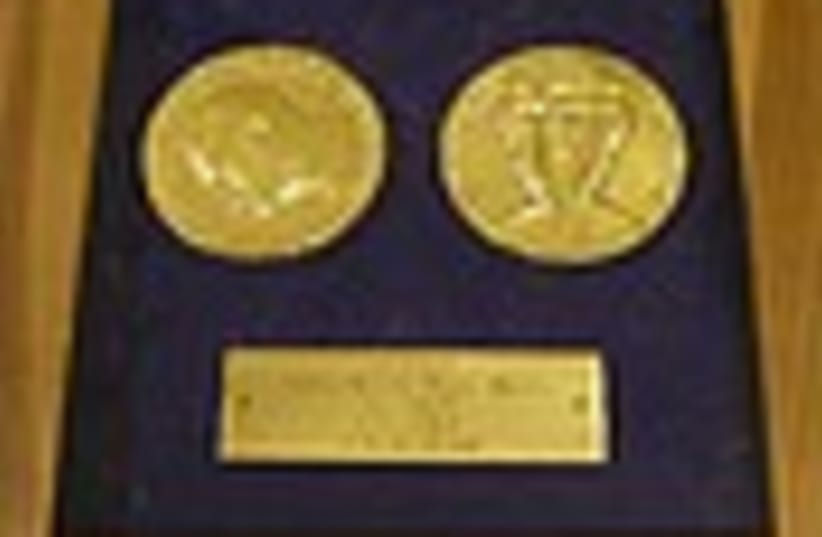And the winner is...
Nobel jurors have made laudable decisions as well as egregiously foolish ones.
I do hope you are right.
- Winston Churchill accepting the Nobel Prize for Literature, 1953
The Nobel Prize in Medicine was awarded this week to Francoise Barre-Sinoussi and Luc Montagnier "for their discovery of human immunodeficiency virus," and to Harald zur Hausen "for his discovery of human papilloma viruses causing cervical cancer."
Hausen, from the Cancer Research Center in Heidelberg, gets half the prize; while Mme Barré-Sinoussi, from the Pasteur Institute, and Montagnier, from the World Foundation for AIDS Research, share a quarter each.
No one questions the wisdom of awarding the prize to these virologists. Since 1981, when AIDS was first identified, 25 million people have died; 33 million live with this incurable disease. Roughly 5,000 AIDS cases have been diagnosed in Israel.
Barre-Sinoussi and Montagnier have made it possible not only to manage the illness, but to screen for HIV in the blood supply. Hausen's work will one day allow scientists to overcome the number two cancer killer among women. It is too bad, however, that the Nobel medical jury - Stockholm's Karolinska Institute - did not see fit to also recognize the contribution of Dr. Robert Gallo, an American virologist widely co-credited with discovering HIV. It's true that the jury was limited to three choices; still, Gallo's exclusion proves that the Nobel awarders don't always get it right.
Nobel, the Swedish inventor of dynamite, died in 1896 and left his fortune to endow the prize named after him. Nobel committees in various fields solicit nominations from academics, scientists, previous laureates and others.
Most of us will have to rely on the wisdom of the physics jury in selecting Yoichiro Nambu, Makoto Kobayashi and Toshihide Maskawa yesterday: Nambu for discovering the "mechanism of spontaneous broken symmetry in subatomic physics" and Maskawa, with Kobayashi, "for the discovery of the origin of the broken symmetry which predicts the existence of at least three families of quarks in nature."
The chemistry award will be announced today; literature follows on Thursday. The peace prize will be revealed Friday, and economics on October 13.
While many Nobel decisions are universally respected, others generate controversy.
For instance, PLO leader Yasser Arafat was awarded one-third of the 1994 prize, along with Yitzhak Rabin and Shimon Peres, for "efforts to create peace in the Middle East" - though he really specialized in creating chaos. Henry Kissinger and Le Duc Tho shared the 1973 prize for helping South Vietnam trade land for peace. Sometimes a peace prize, like the 1929 award to Frank Billings Kellogg, a US secretary of state, reflects the triumph of hope over experience. Kellogg crafted a treaty, ratified by scores of countries including Germany and Japan, which outlawed the use of force in international relations.
So who - of the 33 groups and 164 individuals nominated - will the International Peace Research Institute, the Nobel peace jury, tap this year? Among the leading candidates are two "disappeared" Chinese dissidents, Gao Zhisheng of the Falun Gong and environmental campaigner Hu Jia.
In literature, London bookies are betting on relative unknowns: Claudio Magris, Adonis - said to be one of the Arab world's greatest living poets - and Jean-Marie Gustave Clezio. Dark-horse contenders include Israel's Amoz Oz and Jewish American novelist Philip Roth. It's been 15 years since a US author won. Professor Horace Engdahl, a Scandinavian literature professor and Nobel juror, claims that "The US is too isolated, too insular" to generate world-class fiction.
Jews have done rather well in the Nobel, capturing 19% of the chemistry awards; 41% in economics; 13% in literature; 9% of the peace prizes; 26% in physics and 28% in medicine. Israelis have made their mark too: Robert Aumann for economics (2005); Aaron Ciechanover and Avram Hershko for chemistry (2004); Daniel Kahneman, economics (2002); Rabin and Peres for peace (1994); Menachem Begin, peace (1978); and Shmuel Yosef Agnon for literature (1966).
WHAT THIS suggests, simply, is that in the roster of some 780 prizes given to individuals (and 20 awarded to organizations) since 1901, Nobel jurors have made laudable decisions as well as egregiously foolish ones.
Isn't it good to know that some of the smartest people around are as fallible as the rest of us?
if(catID != 151){
var cont = `Take Israel home with the new
Jerusalem Post Store
Shop now >>
`;
document.getElementById("linkPremium").innerHTML = cont;
var divWithLink = document.getElementById("premium-link");
if(divWithLink !== null && divWithLink !== 'undefined')
{
divWithLink.style.border = "solid 1px #cb0f3e";
divWithLink.style.textAlign = "center";
divWithLink.style.marginBottom = "40px";
divWithLink.style.marginTop = "40px";
divWithLink.style.width = "728px";
divWithLink.style.backgroundColor = "#3c4860";
divWithLink.style.color = "#ffffff";
}
}
(function (v, i){
});

